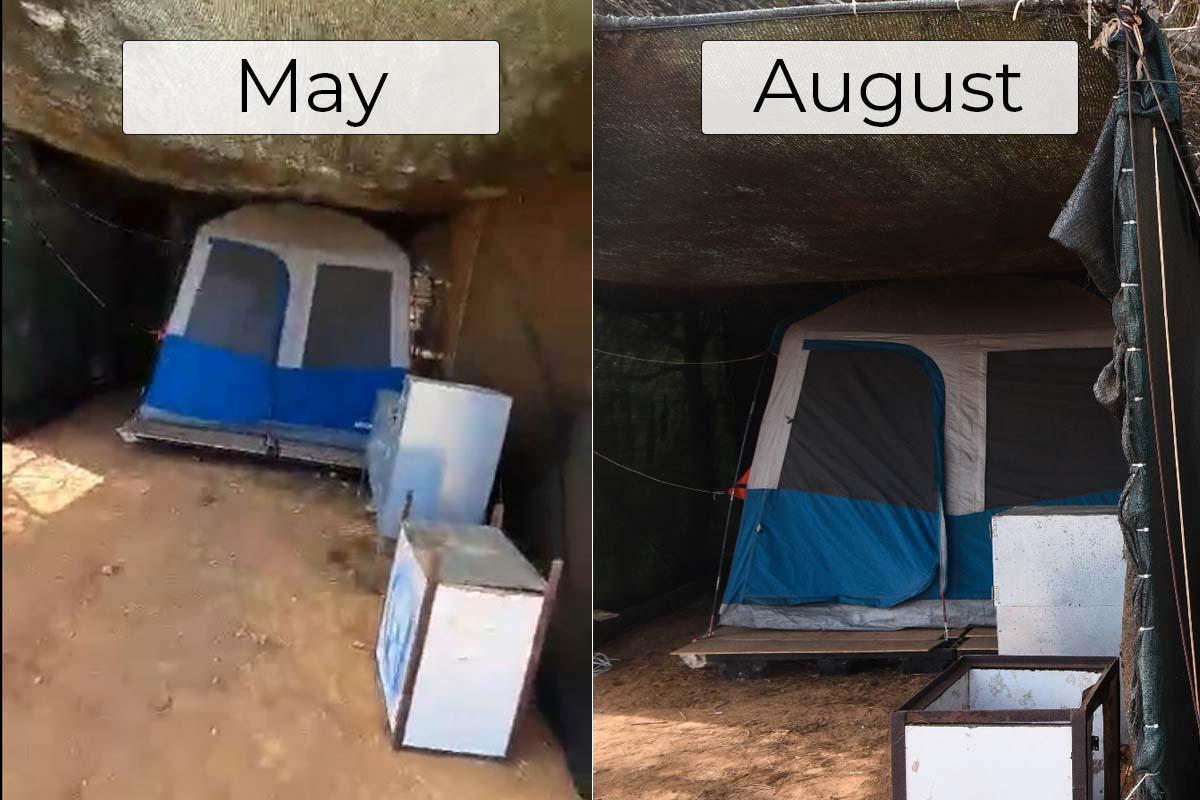Semi-permanent tents at Comino’s camping site have left other campers unable to find any space to pitch their own tents in the limited area, while these structures remain largely unoccupied.
Their only option is to be sandwiched in the scorching sun between “entire houses” that hog shaded spots, as a “free-for-all” situation continues to reign on Comino – a Natura 2000 island.
Camper Leander Duca, who has contacted MPs to point out the “mess”, said he had witnessed the "literal construction of entire houses" at the site since the 2019 shift from the Santa Marija Bay campsite to an area further inland known as Tal-Ful.
Many of the structures remain in place year-round, he said, and include rattan furniture, generators, BBQs and in at least one case even CCTV cameras affixed to poles.
Some of the tents have used wooden pallets, with Duca saying this was done to prevent rainwater from entering in winter, which, in turn, resulted in mice, according to other campers.
 One of the tents taking up residence in Comino for months. Photo: Facebook/Times of Malta
One of the tents taking up residence in Comino for months. Photo: Facebook/Times of MaltaDuca said they were frustrated because they went to Comino only to find that the ideal spots were secured by empty tents. Genuine campers ended up having to settle for days in the scorching sun.
The campers maintained that these tents were – “unfairly” – mostly empty during the week and only being used by “some selfish people” at weekends.
Duca has not camped in Comino since 2020, but took photos and videos of the campsite during a visit in May of this year. When Times of Malta visited the Comino campsite last week, many of the tents and structures which Duca had recorded in May were still there, in the exact same setup.
The problem of semi-permanent tents already existed in the previous camping grounds by Santa Marija Bay. But it has been further aggravated by the shift to Tal-Ful, as the new 10,000-square-metre campsite is much more confined than the previous one.
In 2019, Environment and Resources Authority (ERA) officers cleared tents, tanks and firepits from the makeshift site at Santa Marija, confiscating more than a tonne of material. The area had gradually morphed into a shantytown, with tents remaining year-round.
These tents were mostly empty during the week and only being used by some selfish people at weekends
Since then, Ambjent Malta’s ecological restoration of what was a former wetland behind the sand dunes has started.
At least one of the semi-permanent camps at Tal-Ful is owned by a worker who spends significant stretches of time on Comino. He disclosed that when commenting beneath an article that questioned if parts of Comino could be occupied for an entire summer, writing that he did not need a permit because the area is an official campsite.

Matthew Gauci Abela, president of the Orca NGO, an outdoor recreation and camping association, disagrees with that reasoning.
He pointed out that tents had to be temporary and anything semi-permanent was illegal. Even if the owners stayed there all the time, it was not acceptable, he said.
Gauci Abela listed other problems with the current campsite: cars drove through it “gas down” and the area also contained rusting vehicles and quad bikes, as well as lots of construction waste, with broken tiles and glass in the soil.
Rave parties at the Comino campsite were another issue, he said, with music going on until the early hours and noise pollution disturbing those who sought some peaceful outdoor recreation in nature.
Comino is one of two official public campsites in the country. The other is L-Aħrax in Mellieħa, which requires a permit to use as a camping ground.

“But while there may be no need for a permit at Tal-Ful, good luck with finding a spot,” Gauci Abela warned.
In the association’s recent proposals for outdoor recreation, Orca recommended that wild camping be limited to a maximum of two nights without a permit. Longer stays would require recreationists to seek permits from the relevant local councils.
Campers’ suggestions have included requiring payment to use the campsite, which would prevent people from setting up their tents for such long periods.
Camping should be booked and controlled, it was suggested, to avoid what was effectively squatting in public spaces and turning them into a private site in the summer months.

Ambjent Malta, the environmental agency responsible for the management of the Comino site, should “give strength to its rangers to enforce the law” and lawbreakers should be heavily fined.
The agency ignored questions sent to it by Times of Malta. Questions sent to the Environment Ministry, under which it falls, were also ignored.
Comino has been in the spotlight for other wrong reasons, with a different sort of ‘land grab’ down at Blue Lagoon raising the ire of the public.
Video footage of the entire area occupied by deckchairs and umbrellas, even before beachgoers start to arrive, went viral, raking in thousands of comments criticising the practice.